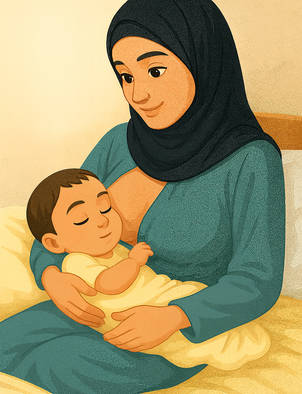Breastfeeding Frequency and Duration
🔹 Newborns need 8-12 feedings per day, approximately every 2-3 hours.
🔹 The duration of a feeding session varies, but it typically lasts 10 to 20 minutes per breast.
🔹 Let your baby nurse from one breast before offering the other to ensure they receive the nutritious hindmilk.
🔹 Babies should also be fed on demand — whenever they show signs of hunger, not strictly by the clock.

Avoid setting a strict time limit—some babies nurse longer than others.
Signs of Hunger and Fullness in Babies

Signs of Hunger:
- Moving hands toward the mouth.
- Making sucking sounds or opening the mouth.
- Becoming restless or turning towards the breast.

Signs of Fullness:
- Slowing or stopping sucking.
- Relaxed hands and body.
- Falling asleep after feeding or losing interest in the breast.
📌 Tip: Do not wait until your baby cries—crying is a late hunger cue.
💡 Remember: Breastfeeding is more than just feeding—it is love, health, and comfort for both you and your baby!

Who to Ask for Help When on the Postnatal Ward
If you need support with breastfeeding or caring for your baby after birth, don’t hesitate to ask for help. Members of your healthcare team can provide guidance and practical assistance:
- Midwife – Can help you position your baby, check the latch, and answer any questions about feeding.
- Lactation Consultant – Offers expert advice on overcoming breastfeeding challenges and improving milk supply.
- Nurse – Assists with feeding techniques and provides reassurance, especially if you are recovering from birth.
- Baby doctor – Monitors your baby’s health and can address any feeding or growth concerns.
- Dietitian – Gives advice on healthy nutrition to support your recovery and milk production.
- Partner or Family Member – Can provide emotional support, help with positioning, and ensure you have time to rest.

💡 Tip: Asking for help early can make breastfeeding easier and more successful.
Create Your Own Website With Webador